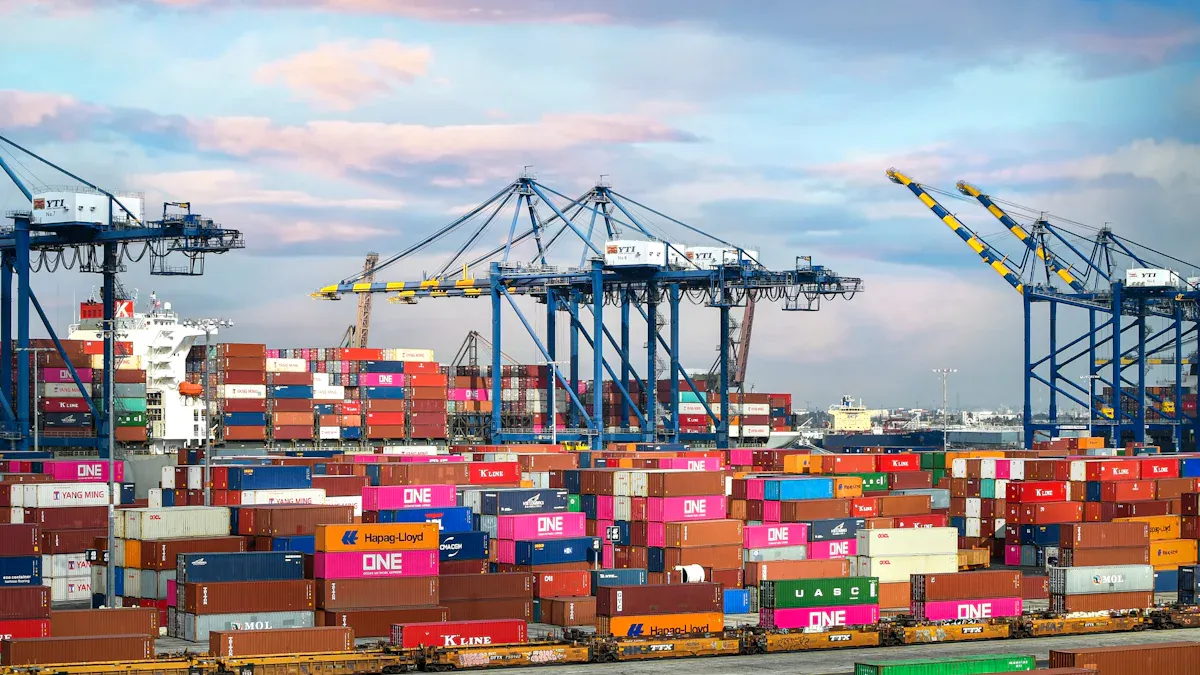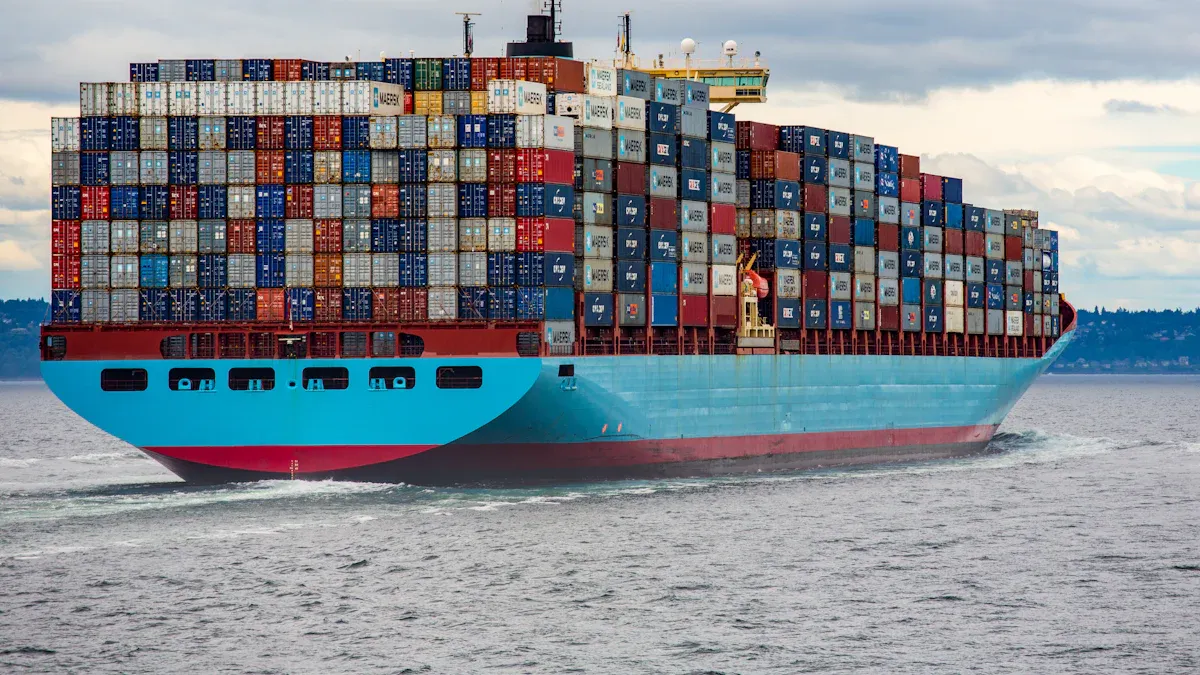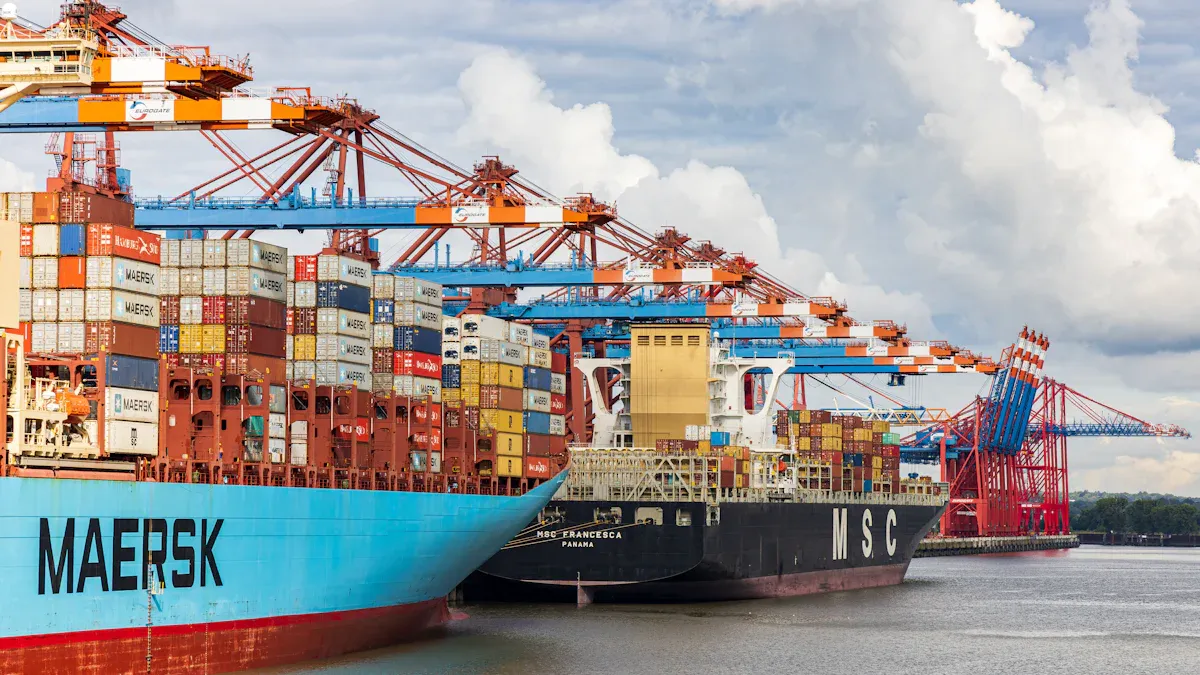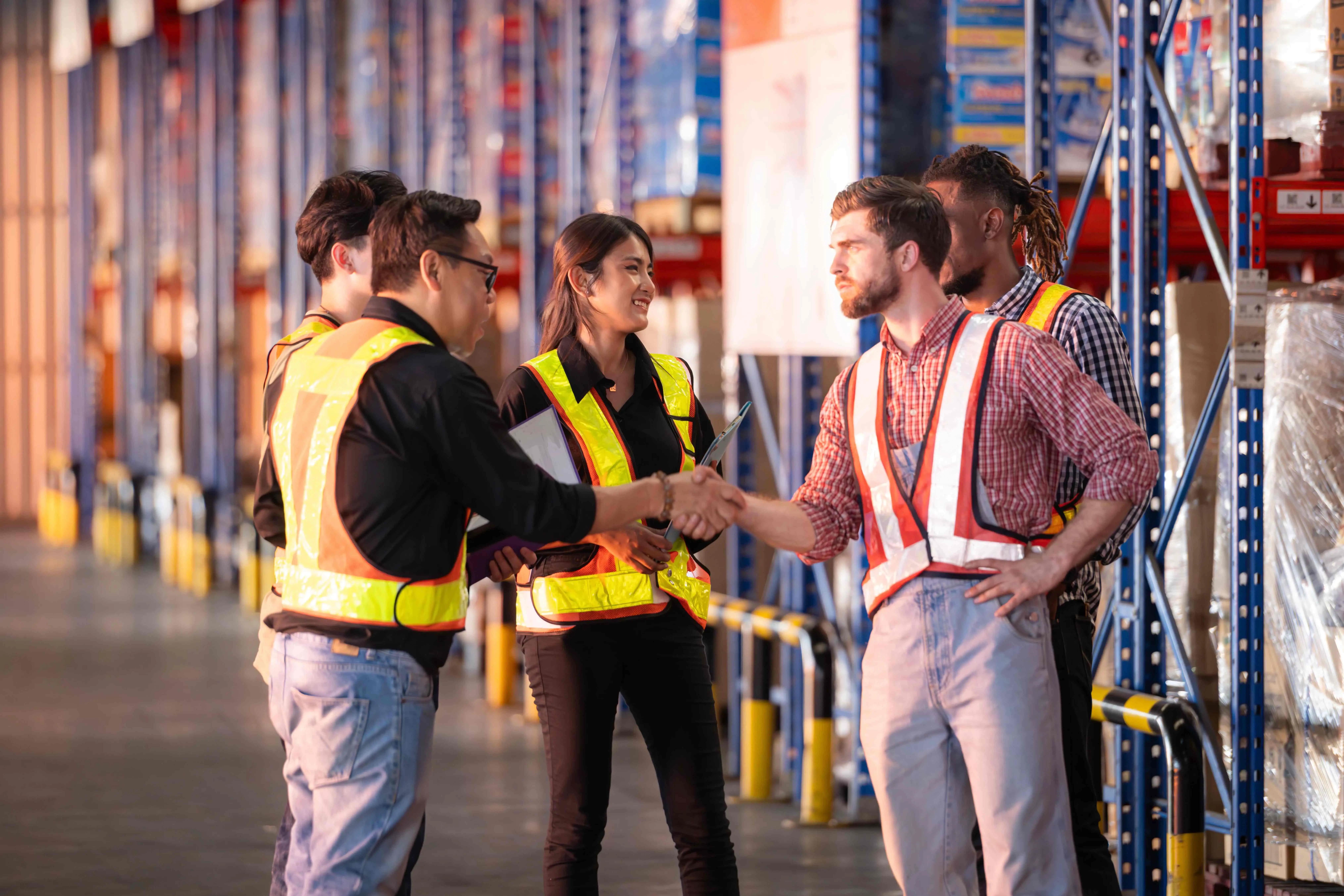How Ocean Freight Shipping Works in 2025

Ocean shipping refers to the transportation of goods across oceans and is essential to global shipping. By 2025, this sector is expected to continue its growth trajectory, with the market projected to increase from $371.98 billion in 2024 to $395.17 billion. Advancements in technology and innovative ideas are driving improvements in ocean shipping, making worldwide trade more efficient and faster.
Key Takeaways
Ocean freight is very important for global trade. It moves over 90% of goods worldwide. Businesses like it because it is cheaper and reliable.
New technology, like AI and automation, makes shipping easier. These tools help avoid delays, save money, and work faster.
JUSDA's JusLink platform helps shipping by giving live updates. It also helps plan better, making shipping quicker and greener.
The Role of Ocean Freight in Global Trade

Why ocean freight is important for world trade
Ocean freight connects countries by moving goods across the globe. It carries more than 90% of all items shipped worldwide. This makes it the main way continents trade with each other. Without it, global trade would face big problems. Over 80% of traded goods depend on ocean shipping.
Ocean freight is cheaper than other shipping methods. This makes it a top choice for businesses. Companies can ship large amounts of goods at lower prices. For example, shipping costs from Asia to the US West Coast will stay 64% higher in 2025 than in early 2024. This shows how much people need dependable shipping options.
How ocean shipping affects the economy and environment
Ocean shipping helps the world economy by moving goods and materials. In 2020, container shipping added $3.01 billion to the economy. By 2030, this number could grow to $3.10 billion. New technology is also helping reduce pollution from shipping. By 2030, container ships might cut CO2 emissions by 564 million tons. This shows ocean shipping can grow while being eco-friendly.

JUSDA’s role in better ocean freight services
JUSDA makes ocean shipping faster and more efficient. Its tools show real-time updates, helping plan shipments better. This reduces delays and extra fees, saving money and time. JUSDA also ensures deliveries are on time, keeping customers happy. Its smart planning improves shipping operations, making it a trusted partner.
JUSDA’s JusLink platform uses AI and IoT to improve shipping. It helps everyone in the supply chain work together smoothly. With JUSDA, you get reliable and eco-friendly shipping solutions made just for you.
Key Steps in Ocean Freight Shipping
Reserving and planning shipments
The first step is booking space on a ship. You also need to plan when the shipment will happen. But this process can be slow and tricky. Only 7% of quotes and 6% of bookings are automated. This makes things harder and takes more time. Shipping internationally can take 20 days and needs 9 to 18 papers. Over 200 emails might be sent during this time. These problems can cause delays and cost more money.
To fix this, companies now use digital tools. These tools make booking and planning easier. They help avoid mistakes and save time. Automation helps shipments move faster and with fewer problems.
Important papers and rules to follow
Having the right papers is very important for shipping. You must follow rules like the Electronic Export Information Filing (EEI). This helps avoid delays and fines. Good records help customs check shipments and prevent mistakes. A survey showed that bad paperwork delays 50% to 75% of shipments. Payment and document issues cost $3 billion each year. This adds $25 per container for half of all shipments.
Following trade rules and checking restricted parties is also important. These steps help avoid fines and make shipping smoother.
Loading, moving, and tracking goods
Goods are loaded onto ships and moved across oceans. Tracking tools are very helpful during this time. They let you see where your shipment is in real-time. Studies show 93% of people want updates during delivery. Tracking also helps manage space and check how well carriers are doing.
Feature | How It Helps |
|---|---|
Automation | Speeds up work in warehouses and shipping. |
Real-time Tracking | Keeps customers happy with shipment updates. |
Technology Integration | Gives better insights for smarter decisions. |
These tools make shipping more dependable and faster.
Customs checks and final delivery
Customs checks are the last big step before delivery. Quick customs processes help shipments arrive on time. Research shows that customs efficiency affects shipping success. Delays here can mess up schedules and raise costs.
After customs, goods are delivered to their destination. Good freight services make sure this step is smooth. By learning these steps, you can handle ocean shipping better.
Key Players and Terms in Freight Shipping
Shippers, freight forwarders, and carriers
Freight shipping has many important players with unique roles. Shippers are people or companies that need to move goods. They depend on freight forwarders to plan and manage the shipping process. Freight forwarders organize shipments and make sure deliveries go smoothly. They combine goods from different clients to save money. This is helpful for small businesses. Carriers are companies that move goods by sea, like Maersk Line and CMA CGM Group.
Did you know? Over 90% of global trade happens through maritime freight, with more than 50,000 merchant ships in operation worldwide.
Statistic | Value |
|---|---|
Cargo transported annually | 1.68 billion tons |
Containers used worldwide | 177.6 million |
Revenue of Kuehne + Nagel (2019) | $28 billion |
Customs brokers and port authorities
Customs brokers and port authorities are key to ocean shipping. Customs brokers make sure shipments follow trade rules. They handle paperwork, calculate taxes, and speed up customs checks. Port authorities manage ports and ensure goods are loaded and unloaded efficiently. Their work affects how fast and reliable shipping is. Ports with skilled workers and 24/7 services reduce delays and improve customer satisfaction.
Key Factors | Description |
|---|---|
Staff Competency | Important for smooth port operations. |
Quality of Infrastructure | Affects customs speed and efficiency. |
Customs Operations | Impacts overall shipping success. |
Common terms: LCL, FCL, Incoterms, and more
Knowing shipping terms helps you understand ocean freight better. LCL (Less than Container Load) means sharing container space with others. It’s cheaper for smaller shipments. FCL (Full Container Load) is when you rent a whole container, which is better for bigger shipments.
Shipping Term | Description | Cost Efficiency | Volume | Urgency |
|---|---|---|---|---|
LCL | Shares container space with other goods | Cheaper for small loads | Less than 14m³ | Less urgent |
FCL | Occupies the entire container | Better for large loads | More than 14m³ | More urgent |
Incoterms explain who is responsible for shipping, insurance, and customs fees. They help buyers and sellers avoid confusion in global trade.
Advancements in Ocean Freight Shipping in 2025

Digitization and the use of AI in ocean shipping
Digital tools have made ocean shipping faster and easier. AI predicts demand, finds better routes, and sets fair prices. For example, big data and AI help adjust prices quickly for fair shipping rates. Blockchain is also important. It cuts down paperwork, automates tasks, and makes shipping clearer. Studies show blockchain lowers costs and supports eco-friendly shipping.
Study | Findings |
|---|---|
Yang (2019) | |
Tan and Sundarakani (2020) | Blockchain helps make freight booking more sustainable. |
Pu and Lam (2020) | Blockchain reduces paperwork by automating processes. |
These tools make ocean shipping more reliable and efficient.
Automation in port and shipping operations
Automation has changed how ports and ships work. Automated cranes and self-driving vehicles now handle containers. These machines work all day and night, speeding up operations. For example, cranes at King Abdulaziz Port in Dammam have cut waiting times. Real-time systems also predict repairs, improving performance by 10%.
Benefits of Automation:
Non-stop operations without delays.
Less energy use and lower pollution.
Automation makes shipping smoother and more eco-friendly.
Sustainability initiatives and green shipping practices
Green shipping helps protect the environment during international trade. Ports now use cleaner fuels like LNG and other alternatives. These methods save money and improve air quality. Green shipping corridors also reduce pollution and bring new businesses to areas. Using eco-friendly practices creates jobs in renewable energy and shipbuilding.
Tip: Choosing green shipping helps the planet and grows port city economies.
Sustainability efforts make shipping better for the environment and people.
JUSDA’s JusLink platform and its role in modern freight shipping
JUSDA’s JusLink platform uses AI, IoT, and big data to improve shipping. It gives real-time updates so you can track shipments easily. The platform helps everyone in the supply chain work together better. By using JusLink, you save money, work faster, and ship sustainably. JUSDA’s focus on new ideas makes it a leader in modern shipping.

JUSDA Solutions
To provide you with professional solutions and quotations.
Ocean freight shipping is key to global trade. It offers affordable ways to move goods worldwide. By 2025, new changes will shape the industry:
Digital Transformation: Tools like AI and IoT make shipping faster.
Sustainability Trends: Cleaner fuels help protect the environment.
Supply Chain Optimization: Automation improves tracking and speeds up work.
JUSDA uses smart tools like JusLink to provide eco-friendly shipping.
See Also
Discovering Innovations in Sea Freight Logistics for 2024
An In-Depth Look at the Future of LTL Freight
Get Prepared: Unpacking New Transport Technologies for Supply Chains
Five Key Trends Shaping Future Supply Chain Efficiency
Navigating Future Logistics Through Advanced Digital Technologies
